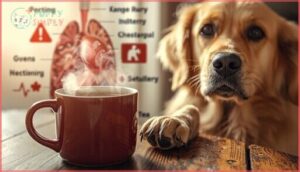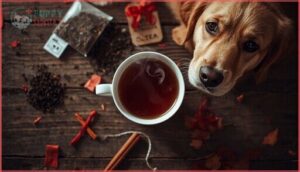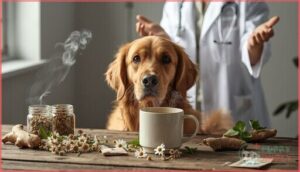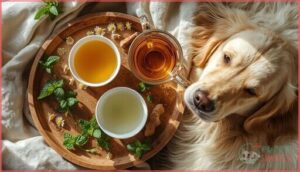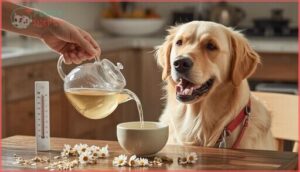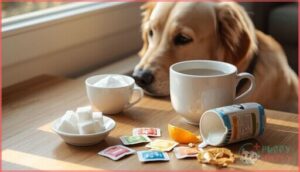This site is supported by our readers. We may earn a commission, at no cost to you, if you purchase through links.
You’ve just settled onto the couch with your favorite cup of tea when your dog’s nose nudges your hand, eyes locked on the warm mug. That familiar look makes you wonder: can dogs drink tea the way we do? The short answer is no, at least not the way you’re probably thinking. While your morning brew might feel harmless, most traditional teas contain caffeine—a compound that doesn’t just give your pup the jitters, it can actually poison them.
But here’s where it gets interesting: certain herbal teas might offer gentle benefits for your dog’s digestion or anxiety, as long as you know which ones are safe and how to serve them properly.
Table Of Contents
- Key Takeaways
- Can Dogs Drink Tea Safely?
- Why is Caffeine Dangerous for Dogs?
- Which Types of Tea Are Unsafe for Dogs?
- Are Herbal Teas Safe for Dogs?
- Health Benefits of Dog-Friendly Teas
- Potential Risks of Giving Tea to Dogs
- How to Safely Offer Tea to Dogs
- Safe Alternatives to Tea for Dogs
- When to Consult a Veterinarian About Tea
- Frequently Asked Questions (FAQs)
- What kind of tea can dogs drink?
- How much tea can a dog safely drink?
- Can puppies drink tea?
- Are there any side effects of giving tea to dogs?
- Is it safe to give tea to a pregnant dog?
- Is there a way to make the tea more appealing to a dog?
- Can puppies drink herbal tea safely?
- How much chamomile tea is too much?
- Are cold teas safer than warm teas?
- Can tea help with dogs bad breath?
- Conclusion
Key Takeaways
- Most traditional teas contain caffeine, which is toxic to dogs and can cause symptoms ranging from restlessness and rapid breathing to seizures and organ damage, making plain water the safest hydration choice.
- Certain caffeine-free herbal teas like chamomile, peppermint, ginger, and rooibos may offer mild benefits for anxiety or digestion when served plain, lukewarm, and in tiny portions (1-2 ounces), but they should never replace water or veterinary care.
- Even herbal teas carry risks including allergic reactions, digestive upset, and potential interactions with medications, so you should always consult your vet before offering tea—especially for puppies, pregnant dogs, or pets with pre-existing health conditions.
- Tea bags themselves pose serious choking and intestinal blockage hazards, and any tea served to dogs must be completely free of milk, sugar, artificial sweeteners like xylitol, and flavor additives, all of which can harm your pet.
Can Dogs Drink Tea Safely?
You might be tempted to share your afternoon tea with your dog, but it’s not as simple as pouring a little extra into their bowl.
While plain, caffeine-free options like chamomile can be safe in moderation, it’s worth exploring calming herbal teas for dogs that are specifically suited to canine needs.
The safety of tea for dogs depends on what’s actually in the cup and how their bodies process those ingredients.
Let’s look at what makes tea either safe or risky for your furry friend.
Tea Ingredients and Canine Health
Tea ingredients vary widely, and not all suit canine nutrition or pet wellness. Caffeine-containing teas like green and black varieties introduce a toxic compound that can harm your dog’s system.
Herbal infusions such as chamomile or rooibos are safer, but tea allergies and sensitivities still matter. Understanding tea ingredients and tea safety for dogs helps you weigh canine health benefits against tea and caffeine toxicity risks.
To learn more about the role of caffeine toxicity in dogs, consult detailed veterinary sources.
Veterinary Perspectives on Tea for Dogs
Most veterinarians discourage caffeine-containing beverages because toxicity levels can quickly become dangerous. Pet hydration should always rely on fresh water, with veterinary advice guiding any additions to canine nutrition.
When you’re weighing tea safety for dogs, vet guidance centers on three key points:
- Choose only caffeine-free herbal options like chamomile or rooibos.
- Serve unsweetened and lukewarm to protect digestion and prevent burns.
- Monitor for tea allergies or sensitivities.
For more about the risks of caffeine poisoning in dogs, consult expert resources.
Why is Caffeine Dangerous for Dogs?
Caffeine affects dogs very differently than it affects people. Even a small amount can trigger a range of uncomfortable and dangerous reactions in your pet.
Caffeine affects dogs far more severely than humans—even a small amount can trigger dangerous reactions in your pet
Let’s look at what happens when a dog consumes caffeine and why the risks go beyond just immediate symptoms.
Symptoms of Caffeine Toxicity
Recognizing caffeine poisoning in your dog early can make all the difference. Within hours, you might notice restlessness, tremors, or hyperactivity. As toxicity progresses, more alarming signs appear—rapid breathing, seizures, vomiting, or even nervous collapse.
| Body System | Early Signs | Severe Signs |
|---|---|---|
| Nervous System | Restlessness, agitation | Canine seizures, confusion |
| Heart & Lungs | Rapid heartbeat | Irregular rhythm, rapid breathing |
| Digestive | Nausea, drooling | Vomiting, diarrhea |
Dog tea safety isn’t just about caffeine sensitivity—it’s about recognizing toxicity signs before they escalate.
Long-Term Health Risks
Beyond immediate caffeine toxicity, repeated exposure creates lasting problems. Chronic kidney damage from persistent strain, thyroid interference affecting hormone balance, dental erosion from acidic compounds, digestive irritation leading to gastritis, and sleep disruption causing mood changes all threaten dog health and safety over time. Even decaf teas with certain additives pose tea toxicity risks that outweigh any canine health benefits:
While some fruits offer safer nutritional alternatives, understanding which foods pose similar digestive risks helps pet owners make informed choices about their dog’s diet.
- Kidney function gradually declines from diuretic effects
- Thyroid hormones become imbalanced with goitrogenic compounds
- Tooth enamel weakens from frequent acidic exposure
- Stomach lining develops chronic sensitivity and inflammation
Which Types of Tea Are Unsafe for Dogs?
Not all teas are created equal regarding your dog’s safety. The main culprits you need to watch out for are the ones that naturally contain caffeine, which can quickly become toxic for your furry friend.
Let’s break down which popular tea varieties should stay off your dog’s menu and why they pose real health risks.
Black, Green, and White Tea Risks
Your dog’s curiosity about your morning cup poses real dangers. Black tea, green tea, and white tea all contain caffeine—ranging from 20 to 60 milligrams per eight-ounce serving—plus trace amounts of theobromine and theophylline.
These compounds cause caffeine toxicity in dogs, triggering restlessness, rapid breathing, and muscle tremors. Puppies and small breeds face higher risks from even modest amounts of tea toxicity.
Earl Grey and Oolong Tea Concerns
Earl Grey carries a double threat: caffeine levels around 40 to 120 milligrams per cup, plus bergamot oil that can upset your dog’s stomach. Oolong tea sits between black and green varieties in caffeine content but is still risky for canine health.
Tea bag risks multiply when curious pets chew discarded bags, leading to potential caffeine poisoning and intestinal blockages—serious pet safety tips you shouldn’t ignore.
Are Herbal Teas Safe for Dogs?
Herbal teas don’t contain caffeine, which makes them a much safer choice for dogs than traditional teas like black or green. That said, not all herbal teas are created equal regarding your dog’s health.
Let’s look at a few popular herbal options and whether they’re truly safe for your furry friend.
Chamomile Tea Benefits and Risks
Chamomile tea stands out among herbal remedies for its gentle calming properties, thanks to compounds like apigenin that support canine relaxation without caffeine-related tea toxicity. While this herbal tea offers real tea benefits for anxious pups, you’ll want to watch for potential issues:
- Tea allergies can appear as itching or stomach upset in sensitive dogs
- Herbal interactions may affect dogs on sedatives or blood thinners
- Chamomile calming works best in small, occasional amounts—not daily doses
Always check with your vet first to protect your dog’s canine health.
Peppermint Tea for Digestive Health
If you’ve ever sipped peppermint tea to settle your own stomach, you might wonder whether this herbal remedy works for canine wellness too.
Peppermint oil compounds in tea infusions can support gut health by relaxing digestive muscles and easing bloating—making peppermint tea one of the gentler natural remedies for dogs when served plain and caffeine-free in tiny amounts for dog health and wellness.
Ginger and Rooibos Tea Considerations
Ginger tea and Rooibos tea both offer caffeine-free options that some owners explore as natural remedies for dogs, though caution remains essential for canine health and wellness.
Consider these herbal tea considerations before serving:
- Ginger benefits include easing nausea and supporting digestion when heavily diluted
- Rooibos antioxidants provide gentle wellness support with low tannins
- Tea allergies and herbal interactions can still occur, affecting canine hydration
Always consult your vet first.
Health Benefits of Dog-Friendly Teas
When offered safely, certain herbal teas can actually support your dog’s health in gentle, natural ways. These caffeine-free options aren’t just harmless—they may provide real benefits for specific concerns like anxiety, digestion, or inflammation.
Let’s look at how some dog-friendly teas can help your furry friend feel their best.
Calming Effects of Chamomile
If your dog often paces during thunderstorms or has trouble settling down at night, chamomile tea might offer gentle relief. The essential oils and flavonoids in chamomile work together to calm the nervous system and ease muscle tension naturally. This herbal remedy can reduce anxiety and promote relaxation without harsh side effects.
| Chamomile Benefit | How It Helps Dogs | Best Used For |
|---|---|---|
| Nervous system support | Interacts with calming receptors | Stressful situations |
| Muscle relaxation | Eases physical tension | Restless behavior |
| Sleep quality improvement | Promotes restfulness | Nighttime settling |
Antioxidant Properties in Herbal Teas
Beyond calming nerves, herbal infusions bring antioxidant properties that protect your dog’s cells from daily wear and tear. Polyphenol content in lemon balm and peppermint gives these teas strong free radical scavenging power, sometimes exceeding 100 mg Trolox equivalents per serving.
- Bioactive compounds like rosmarinic acid support oxidative balance
- Flavonoids contribute to cardiovascular and metabolic health
- Antioxidant capacity persists even with short steeping times
- Herbal tea blends often deliver stronger benefits than single herbs
Digestive Support From Ginger and Peppermint
When your dog’s stomach feels off, ginger tea and peppermint tea work as natural soothers through different pathways. Ginger benefits include stimulating digestive enzymes like amylase while calming inflammation, making it excellent for nausea. Peppermint relief comes from menthol relaxing intestinal muscles, easing gas and bloating.
Together, these herbal remedies support digestive health better than either alone—a cornerstone of thoughtful canine nutrition and diet using herbal teas.
Potential Risks of Giving Tea to Dogs
Even though certain herbal teas can offer benefits to your dog, it’s important to understand that not all tea is created equal. Some risks aren’t obvious at first glance, and what seems harmless might actually cause problems for your furry friend.
Let’s look at two key concerns you should keep in mind before offering tea to your dog.
Allergic Reactions and Sensitivities
While most dogs tolerate herbal teas without issue, some may develop sensitivities or allergic reactions. Your dog’s immune system might respond to ingredients in tea, even caffeine-free varieties, creating unexpected problems.
Watch for these warning signs after offering tea:
- Skin reactions like hives, redness, or persistent scratching
- Respiratory issues including sneezing, coughing, or wheezing
- Food sensitivities showing as vomiting or diarrhea
- Facial swelling or excessive drooling
- Anaphylaxis response requiring emergency care
Stop tea immediately if symptoms appear.
Risk of Dehydration and Tea Bags
Beyond allergic reactions, tea bags themselves pose serious safety hazards. If your dog swallows a tea bag, the material can cause intestinal blockage—a life-threatening emergency.
Even without ingestion, caffeinated tea carries dehydration risks. Caffeine acts as a diuretic, increasing urine production and fluid loss. This disrupts your dog’s fluid balance, especially in smaller breeds.
Stick with herbal alternatives and always remove tea bags before offering any liquid.
How to Safely Offer Tea to Dogs
If you’ve decided that herbal tea might benefit your dog, preparation matters just as much as picking the right variety. Getting the temperature, portion size, and ingredients right can make the difference between a safe treat and an upset stomach.
Let’s walk through the key steps to serve tea safely to your furry friend.
Proper Serving Methods and Portions
If you’ve decided to share a bit of herbal tea with your pup, proper tea serving guidelines and portion control make all the difference. Here’s how to do it safely:
- Limit portions to 1-2 ounces per serving to avoid unnecessary fluid intake monitoring issues
- Serve at room temperature (68–86°F) to prevent mouth burns
- Offer in a clean bowl dedicated to your dog
- Space servings 24 hours apart, limiting herbal teas for dogs to twice weekly
- Remove tea bags immediately to prevent choking hazards
Always verify caffeine limits are respected—only use caffeine-free herbal tea safety options like chamomile. Keep fresh water available alongside any tea for dogs, since tea shouldn’t replace regular hydration. Monitor your dog’s response for several hours after serving, watching for signs of discomfort or sensitivity that might affect canine health benefits.
Avoiding Milk, Sugar, and Additives
When preparing tea for dogs, skip the extras—plain is best. Milk can trigger lactose intolerant reactions, sugar adds unnecessary calories, and some additives like xylitol are outright toxic. Stick to dog-friendly beverages that support natural pet care and canine nutrition.
| What to Avoid | Why It’s Risky | Safe Alternative |
|---|---|---|
| Milk or cream | Lactose intolerant dogs may develop digestive upset | Plain water |
| Sugar or honey | Contributes to weight gain and dental decay | Unsweetened tea only |
| Artificial sweeteners | Xylitol causes severe toxicity in dogs | Nothing—skip all sweeteners |
| Flavor additives | Bergamot or citrus oils irritate stomachs | Pure herbal tea |
| Caffeine sources | Even traces harm dogs | Verified caffeine-free options |
Always check labels for tea ingredient safety and hidden dairy derivatives before offering any tea for dogs.
Safe Alternatives to Tea for Dogs
If you’re wondering what to give your dog instead of tea, you’ll be happy to know there are safer, simpler options. Plain water should always be your go-to choice, but there are also specially formulated herbal products designed just for dogs.
Let’s look at these alternatives so you can keep your pup hydrated and healthy without any guesswork.
Fresh Water as Primary Hydration
You can’t go wrong with plain water as the ultimate benchmark for your dog’s hydration needs. Fresh, clean water maintains fluid balance, kidney function, and daily consumption requirements without any risk.
Water quality matters—change it regularly and keep bowls clean. It’s the safest choice for canine nutrition, dog health, and overall pet care and wellness.
Dog-Specific Herbal Products
If you’re looking for natural remedies for dogs beyond herbal tea, dog-specific herbal supplements offer safer alternatives. These dog-friendly products include tinctures, powders, and chews formulated for canine nutrition and pet wellness.
Many blends feature chamomile, valerian, or ginger to support digestive health, skin conditions, or anxiety. Dog calmers with natural remedies provide targeted benefits without guesswork, always with clear dosing for your pet’s weight.
When to Consult a Veterinarian About Tea
Even when you’re offering herbal teas that are generally safe, there are times when you shouldn’t make that call on your own. Some dogs need extra caution because of their health history, and even safe ingredients can cause unexpected reactions.
Let’s talk about when it’s time to pick up the phone and check with your vet before serving tea to your pup.
Dogs With Pre-existing Conditions
If your dog has any ongoing health issues—think cardiac care needs, kidney health concerns, arthritis management, endocrine balance problems, cancer support, or pancreatitis—you’ll want to talk to your vet before offering tea.
Even caffeine-free herbal teas can interact with medications or worsen symptoms. Caffeine toxicity is especially dangerous for dogs already managing chronic conditions, so always check first.
Monitoring for Adverse Reactions
After your dog drinks any tea, watch closely for the next 24 hours—this observation period is your safety net. Record baseline vitals like heart rate and temperature, then use a symptom checklist to track restlessness, vomiting, or signs of caffeine toxicity.
Monitor fluid intake and track ingredients for specific sensitivities. Contact your vet immediately if you notice toxic substances affecting canine health benefits.
Frequently Asked Questions (FAQs)
What kind of tea can dogs drink?
Think of tea for dogs like a minefield—stick to the safe path. Herbal teas like chamomile tea, peppermint tea, rooibos, and ginger are caffeine-free herbal teas your dog can occasionally enjoy in tiny amounts.
How much tea can a dog safely drink?
The safest dosage guideline is zero caffeinated tea for dogs. If your vet approves herbal options, limit intake to under one ounce per ten pounds of body weight daily to avoid caffeine toxicity and stomach irritation.
Can puppies drink tea?
No, puppies shouldn’t drink tea. Caffeine toxicity poses serious risks like rapid heart rate and seizures.
Even decaffeinated herbal teas for dogs can upset their developing digestive systems, so stick with fresh water for puppy hydration tips.
Are there any side effects of giving tea to dogs?
Yes, tea can cause caffeine toxicity, tannin irritation, digestive upset, and organ strain in dogs. Even herbal teas for dogs may trigger allergic reactions, so monitoring your pet’s response is essential for canine health benefits.
Is it safe to give tea to a pregnant dog?
No—pregnancy tea risks are real. Caffeine toxicity threatens both mom and developing puppies, raising heart rates and causing restlessness.
Even herbal tea safety isn’t guaranteed without vet-approved guidance on canine hydration needs.
Is there a way to make the tea more appealing to a dog?
Most dogs won’t naturally find tea appealing, so your best bet is serving it at room temperature mixed with low-sodium broth or frozen into ice cubes with dog-friendly flavors for occasional variety.
Can puppies drink herbal tea safely?
Typically, herbal tea isn’t recommended for puppies because their developing systems are extra sensitive. Even caffeine-free options like chamomile can cause stomach upset, so always consult your vet first.
How much chamomile tea is too much?
For small to medium dogs, limit chamomile tea to ¼ cup once daily. Larger dogs can have ½ cup, but never exceed two servings daily without your veterinarian’s guidance to avoid potential complications.
Are cold teas safer than warm teas?
Temperature doesn’t make tea safer for dogs. Cold and warm versions contain the same caffeine levels when brewed identically, so both caffeinated teas remain toxic. Stick with caffeine-free herbal options regardless of temperature.
Can tea help with dogs bad breath?
Looking for fresh breath tips? Chamomile or peppermint herbal teas might offer mild dog oral health benefits by supporting canine digestion, but they won’t replace proper dental care.
Fresh water and vet-approved bad breath remedies work better.
Conclusion
Sure, you could let your dog sip Earl Grey and wait for the emergency vet bill—or you can stick with plain water and save yourself the drama.
The truth is, most teas pose real risks, and the “benefits” rarely outweigh safer alternatives. If you’re wondering whether dogs can drink tea, remember: your pup doesn’t need a caffeine buzz or herbal experiment.
Fresh water, vet-approved supplements, and common sense work better than any trendy brew.


